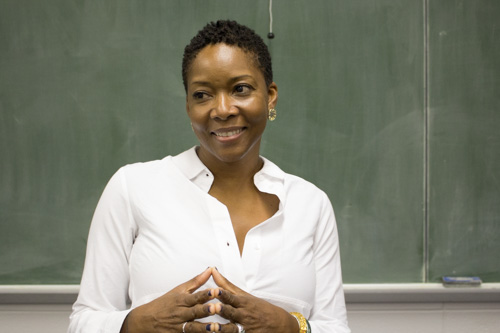Tags
Related Posts
Share This
Costume Designer Rita McGhee Visits
“What the fuck?” Spike Lee yelled at Costume Designer Rita McGhee. “You’re bringing that stuff down here? Don’t you know everyone can see you?” The director was inches away from her face. McGhee stood in the street holding a plastic bag containing a bra and panties, while onlookers watched every move of the production. “If you ever want to work with me again…” he continued. Despite being screamed at by one of America’s top film directors, all McGhee could think of at the moment was, “I get to work for him again!”
McGhee has worked in costume design for 25 years and was nominated for an Emmy in 2015 for her work on the hit television series, Empire. She recently visited SFUAD with her daughter Troi Speaks, a prospective Creative Writing student. “This school is awesome,” McGhee says. “I want to come here.”
In a side room of the Greer Garson Theatre, Design and Technical students gather to hear McGhee speak. Even students from outside majors are present. Film major La’Charles Trask says, “Artists need to understand that it’s good to know the business end of the industry. It’s not always about the glitz and glamour.”
McGhee began her work in the field following graduation from Howard University in Washington, D.C. She told her academic advisor that she wanted to dress people on television. “That’s called costume design,” he said. McGhee sent her resume and cover letter to Spike Lee’s 40 Acres and a Mule Filmworks production company. She was persistent and kept calling. Eventually, Costume Designer Ruth E. Carter took notice and offered her an internship. The Oscar-nominated designer has since become McGhee’s personal mentor.
“I was willing to do anything I was asked to do,” McGhee says. “Now that I’ve gotten an Emmy nomination, some people think they can’t afford me, but I’ll do the job anyway.” McGhee believes it is important to take any type of work, regardless of compensation. That includes student projects, where she may only receive lunch as payment. The more people she gets to work with, the more she learns.
Performing Arts Department Chairwoman Laura Hawkes says McGhee is “an awesome example of how many details you have to keep track of in this industry.” For each episode of Empire, McGhee “had a budget of $20,000 to do each character’s costume changes, the tailoring, dying, renting, shopping, everything.” McGhee adds, “And if you go over the budget, it’s not good.”
Sometimes the show’s creator, Lee Daniels, requested clothing from specific designers. Whether it was Donatella Versace or Tom Ford, McGhee had to navigate the difficult waters of the fashion industry to put her actors in high-end costumes. “I’d call and say, ‘We’re working with Taraji P. Henson. She was nominated for an Oscar for The Curious Case of Benjamin Button.’ They’d tell me they’d never heard of her.” When McGhee was able to obtain an outfit from a big-name designer, it couldn’t be used for any scenes with explosions or blood. Now that the show is popular, McGhee says people are throwing clothes at them. Unfotunately, she is unable to reap the benefits, as she was not asked back for the second season. “It’s all good,” she says. “It’s part of the business. I just move on to the next thing.”
The next thing for McGhee was to work on Spike Lee’s forthcoming film, Chi-Raq, a modern adaptation of Aristophanes’ Lysistrata. Whereas Empire had McGhee shopping at high-end stores in Chicago, Chi-Raq took her to the seedier side of town. “Our assistant costume designer would do the shopping,” McGhee says, “and then they’d call transportation so nobody would rob them as they put the clothes in the trunk.”
The work days can be very long, regardless of whether one is working in television or film. While working on Lee’s film, the director decided that he wanted all 38 cast members wearing white, even though other wardrobes had already been approved. McGhee’s team had to purchase all of the new costumes over the weekend in order to shoot on Monday. “We’d go from store to store as they closed. When one store would close, I’d say, ‘Target’s open!’ We’d get all we could at Target and then when Target closed I’d say, ‘Okay, Wal-Mart’s open!”
Working in the industry can take a toll on crew members, a toll that not everyone is able to deal with. For McGhee, it’s the only thing she wants to do. “If [George Lucas] is at the height of building this amazing production and he fusses at me, I’ll take the fussing instead of complaining about what he called me. I’d rather work on a great project than be upset about somebody saying the F-word.”
McGee no longer argues with people who are difficult. She listens patiently and gives them what they ask for. If she does fall into the trap of taking something personally, she vents her frustration in the car and then gets back to work. The advice is helpful to Theatre Design Tech major Teeka Murphy. “I learned that I should never give up if I’m being annoyed,” Murphy says. “You just have to let things slide off of you.”
A student asks McGhee if anyone get jobs because of who they know. “It’s not who you know,” McGhee says. “You have to be talented. Knowing people might help you get your foot in the door, but if you can’t perform, it means nothing.” McGhee encourages students to stay relevant, keep learning, and continue working. “If you don’t perform, there’s another person in line who will get the job. Hard work always pays off.”
Spike Lee’s film, Chi-Raq, is set for a Dec. 2015 release. McGhee’s work can also be seen in the upcoming BET original series, Zoe Ever After, starring Brandy Norwood. The series premieres Jan. 2016.










 Jackalope Magazine is the student magazine of Santa Fe University of Art and Design. Building on the interdisciplinary nature of our education, we aim to showcase the talent of our university and character of our city.
Jackalope Magazine is the student magazine of Santa Fe University of Art and Design. Building on the interdisciplinary nature of our education, we aim to showcase the talent of our university and character of our city.
Recent Comments